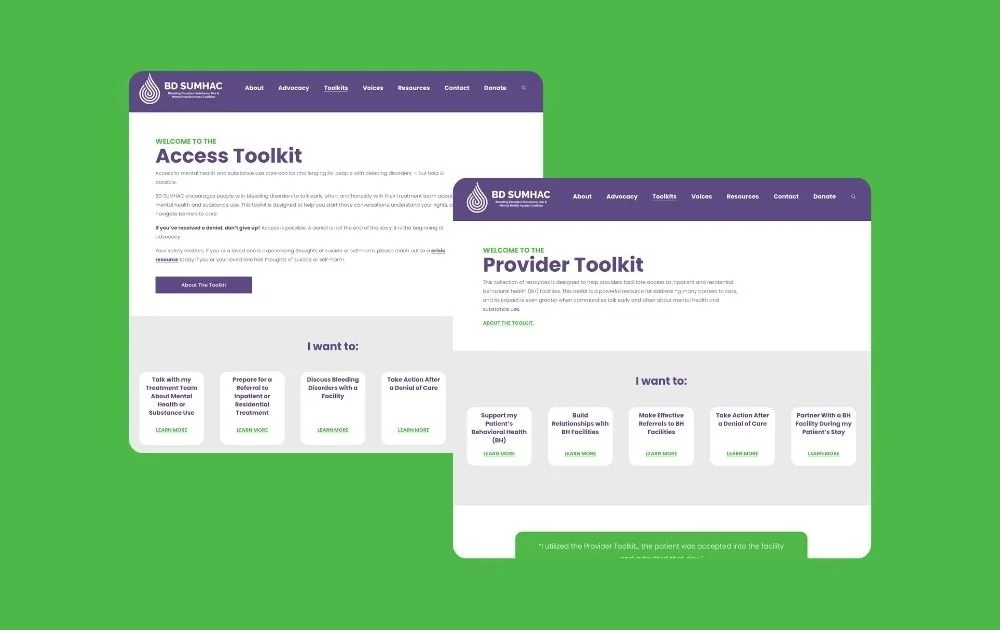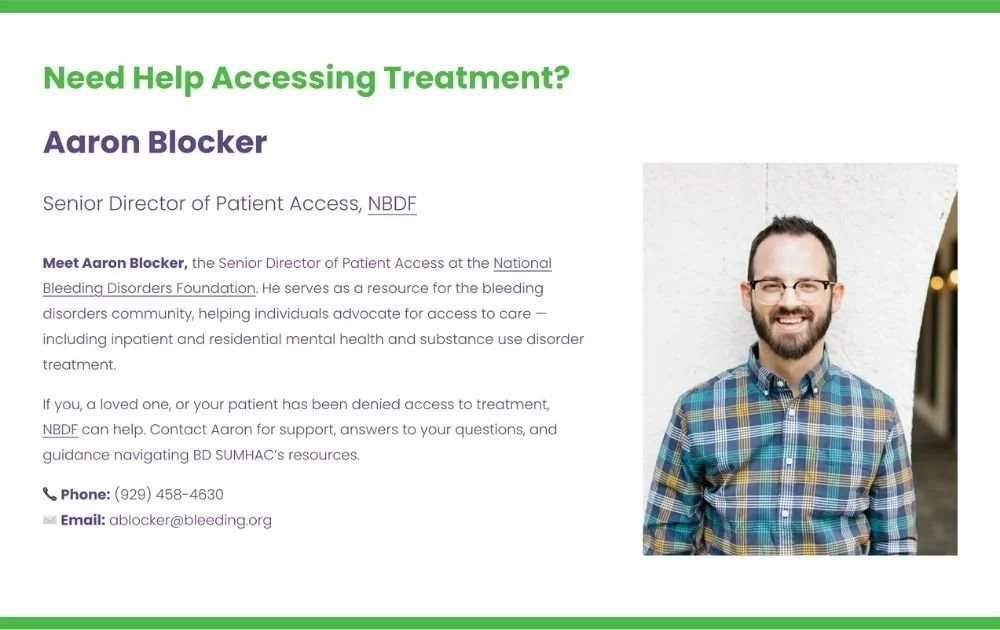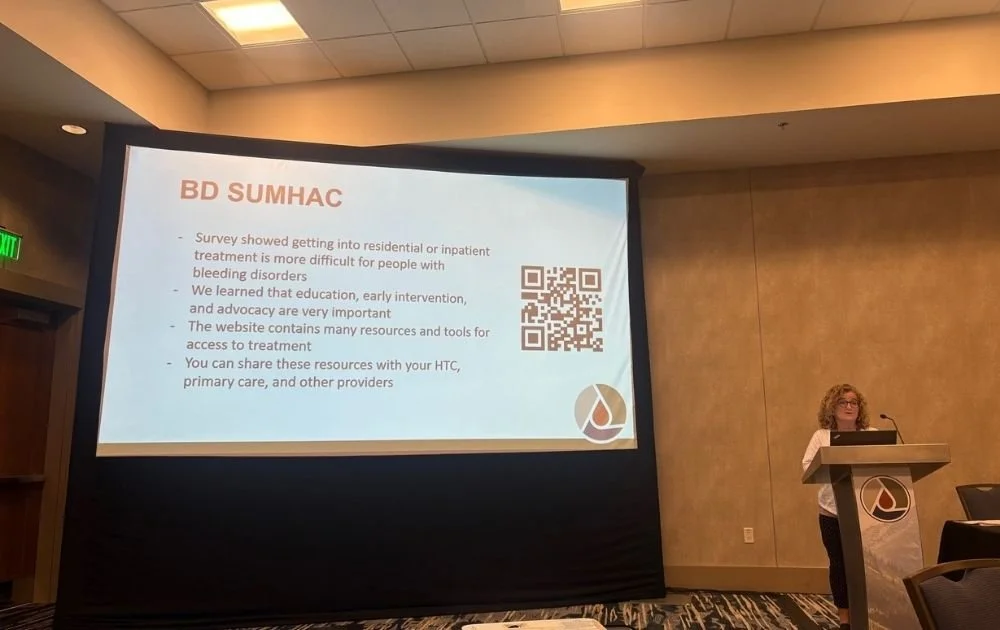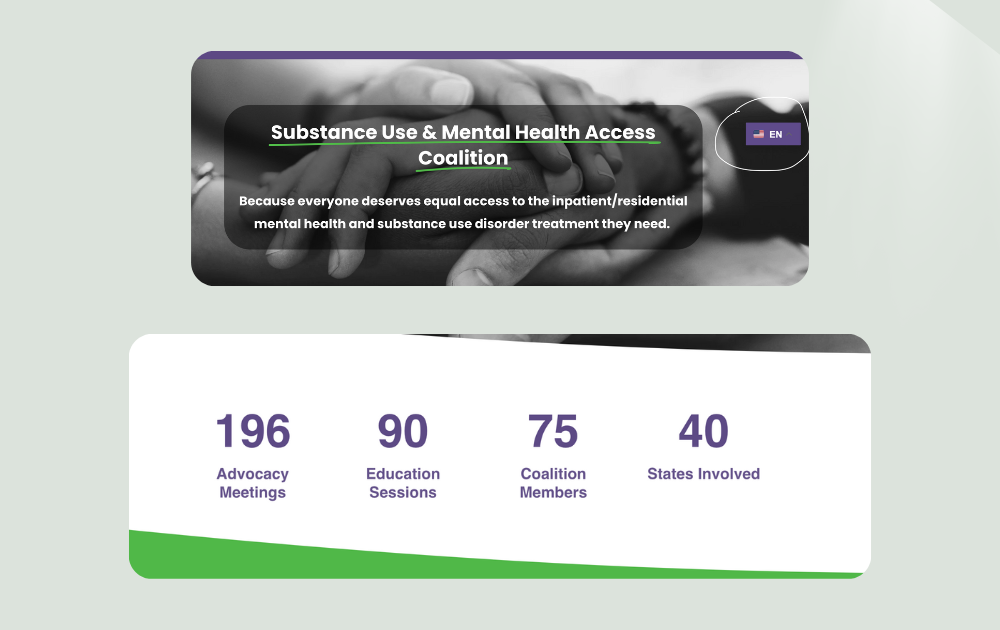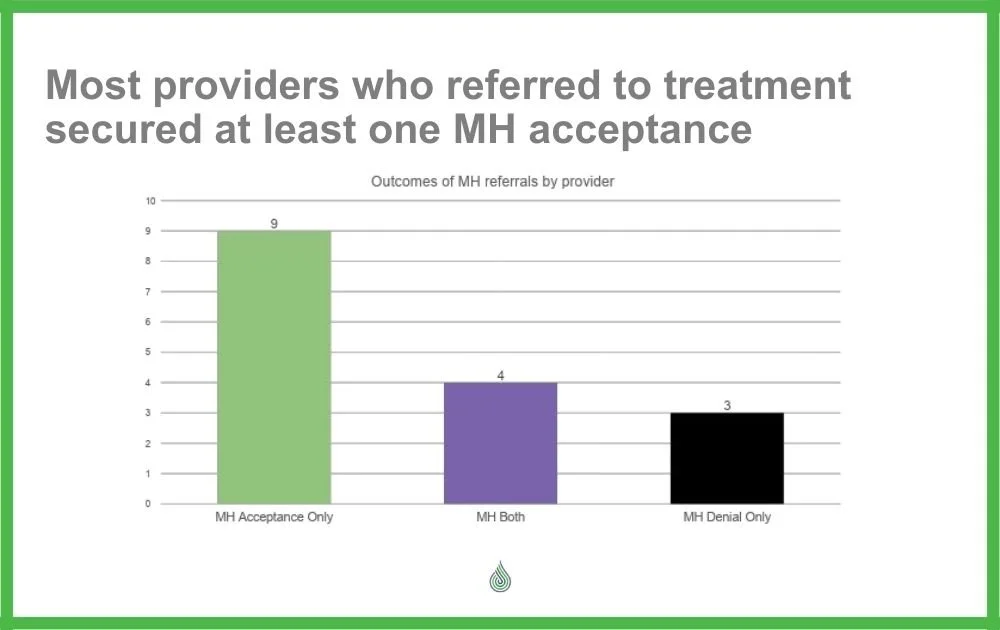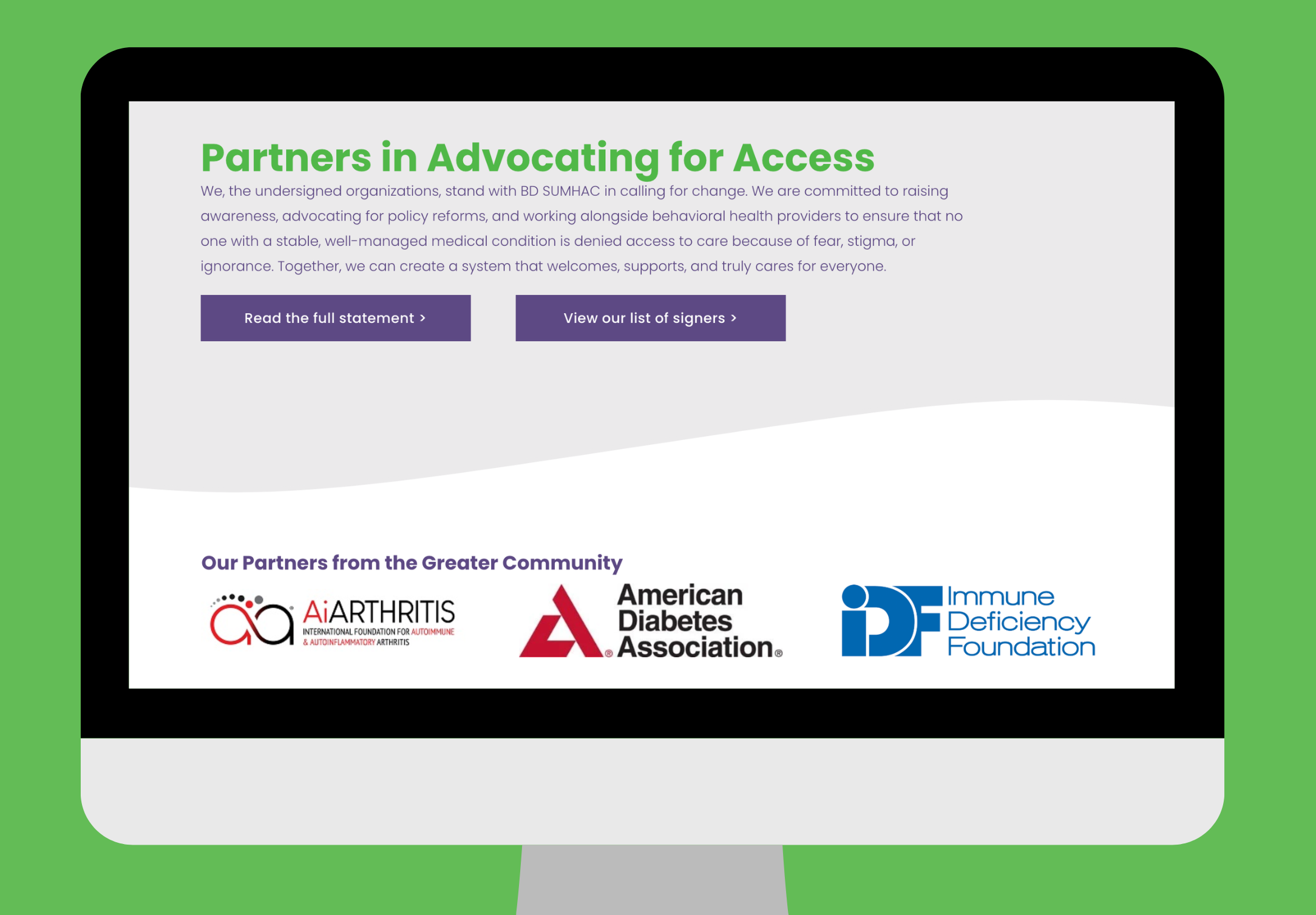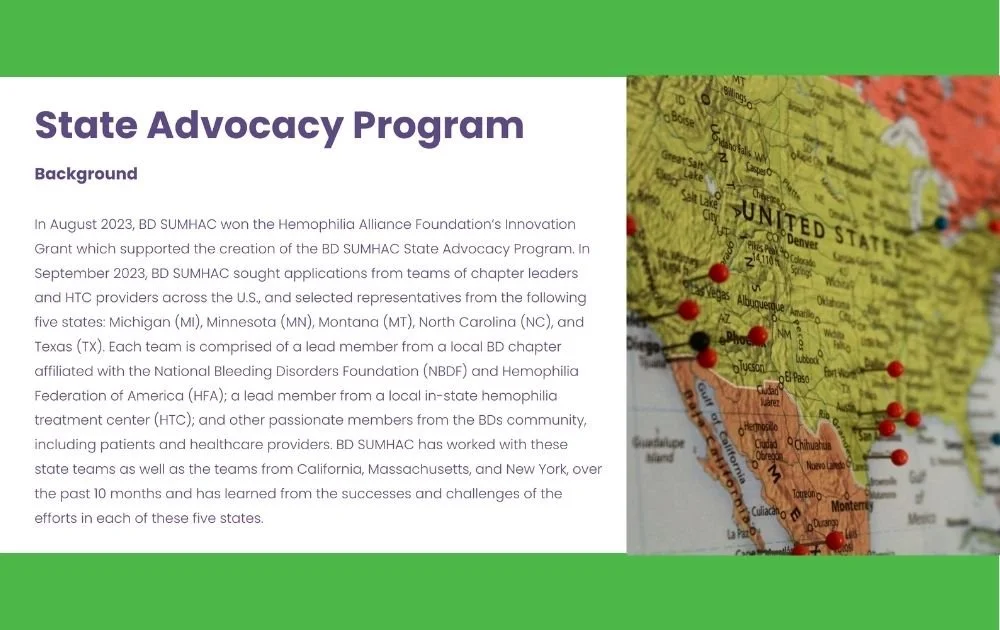Impact
Since day 1, the commitment of BD SUMHAC’s team members to breaking down barriers to behavioral health access has propelled the work forward at a remarkable rate.
From its first meeting with ten people, BD SUMHAC has grown to over 50 team members from 29 states united in mission, and it is making a difference. In its first two years, BD SUMHAC made presentations at more than 50 in-person and virtual events to raise awareness both inside and outside the bleeding disorders community. BD SUMHAC has supported providers in five states in getting their patients who were initially denied access to treatment because of their bleeding disorders, the placements they needed.
In addition to the community member lives that have been changed by this work, BD SUMHAC has made significant impact at the policy level. Explore the timeline below to see how, with our dedicated members and supporters, BD SUMHAC has increased access for the bleeding disorders community. Together, BD SUMHAC is shaping a world where everyone has equal access to the inpatient and residential mental health and substance use disorder treatment they need.
-
In December 2025, BD SUMHAC finalized major updates to its Provider Toolkit and Access Toolkit, making both more streamlined, easier to navigate, and packed with new behavioral health access resources.
-
In October 2025, the Michigan Department of Licensing and Regulatory Affairs held a public meeting on draft regulations that incorporated BD SUMHAC-recommended language to increase access to inpatient and residential substance use treatment for people with bleeding disorders and others who use infusion medications. Michigan also included BD SUMHAC’s language in draft updates to regulations governing inpatient psychiatric facilities – an encouraging milestone in a longer advocacy journey. These advances were driven by the advocacy and leadership of Zach Ryan (Hemophilia Foundation of Michigan) and Dave Rushlow, LMSW (Munson Medical Center Northern Regional Bleeding Disorders Center).
-
In September 2025, BD SUMHAC partnered with NBDF’s Senior Director of Patient Access, Aaron Blocker, to expand advocacy support for individuals seeking inpatient and residential behavioral health treatment.
-
In September 2025, BD SUMHAC worked worked closely with Senator Molly Cook to draft and introduce Texas Senate Bill 2769, aimed at improving access to inpatient psychiatric care for people with bleeding disorders. To support this effort, the Texas State Advocacy team held 62 advocacy meetings educating lawmakers, strengthening relationships, and laying the groundwork for future legislative change.
-
In August 2025, BD SUMHAC presented at the National Bleeding Disorders Foundation’s National Bleeding Disorders Conference, highlighting barriers to behavioral health treatment and sharing practical strategies to improve access.
-
In August 2025, as part of the State Advocacy Program, advocacy teams in Pennsylvania and Wisconsin identified state officials willing to help facilitate access for individuals who are denied admission to inpatient or residential behavioral health facilities.
-
In April 2026, BD SUMHAC launched a Spanish-language of its website and introduced a live advocacy tracker highlighting education activities, coalition growth, and ongoing momentum in real time.
-
In March 2025, BD SUMHAC conducted the 2025 HTC Provider Survey, which showed measurable improvements in access since 2022. These findings underscored the impact of sustained advocacy and education efforts.
-
In March 2025, BD SUMHAC launched the Partners for Access Program, partnering with national health organizations to address shared barriers to behavioral health treatment. These collaborations resulted in a joint statement of support, reinforcing the importance of individualized, inclusive access to care.
-
In March 2025, BD SUMHAC was the featured presenter at the Minnesota Department of Human Services’ monthly Thursday Connections meeting for SUD providers. BD SUMHAC educated approximately 100 local providers about bleeding disorders and state and federal access regulations.
-
In January 2025, BD SUMHAC launched a Facility Outreach Program. Over the course of 2025, BD SUMHAC educated nine behavioral health facilities, all of which expressed interest in working with our community and a willingness to accept individuals with bleeding disorders — an important step toward expanding real-world access to care.
-
In January 2025, BD SUMHAC strengthened its State Advocacy Program by welcoming three new states — California, Wisconsin, and Pennsylvania — while continuing active advocacy efforts in North Carolina, Michigan, and Texas. Together, the state teams advanced policy reform, educated providers, and engaged facilities to improve access to behavioral health treatment at the local level.
-
In January 2025, BD SUMHAC released a comprehensive year-in-review infographic as a summary of the top accomplishments of 2024. These accomplishments included: achieving all 2024 State Advocacy Program goals with all five states in the program (MI, MN, MT, NC, TX) identifying champions, mapping regulations, educating officials, and outlining next steps to improve access, sharing tools and raising awareness at all regional hemophilia treatment center meetings nationwide, and much more. The infographic can be found here.
-
In November 2024, the Michigan state advocacy team submitted comments and recommendations for revising state regulations for mental health and substance use treatment facilities. If adopted, these recommendations will expand access for the bleeding disorders community and other patient communities who require the use of infusion medications. Learn more.
-
In October 2024, BD SUMHAC launched a comprehensive State Advocacy Playbook based on the successes and challenges encountered by each state that participated in the 2024 State Advocacy Program. This resource provides in-depth insights into the advocacy efforts within MI, MN, MT, NC, and TX, along with a step-by-step guide and specific recommendations for future state advocacy work in other states. This playbook will be updated as the State Advocacy Program continues.
-
In September 2024, BD SUMHAC worked with the National Bleeding Disorders Foundation (NBDF)’s Medical and Scientific Advisory Council to establish that there is nothing inherent in bleeding disorders that would prevent people with stable conditions from receiving inpatient/residential mental health and substance use disorder treatment. MASAC outlined these recommendations in MASAC Document 289. This document replaces Document 279, which was approved last year and focused on recommendations for reducing barriers to substance use disorder treatment. Document 289 builds on 279 and incorporates recommendations for access to mental health treatment and programs for individuals with bleeding disorders.
-
In May 2024, after advocacy from BD SUMHAC, the U.S. Department of Health and Human Services (HHS), through its Office for Civil Rights (OCR), finalized a new rule under Section 504 of the Rehabilitation Act of 1973, increasing equity and access to behavioral health facilities for people with bleeding disorders. The new rule, entitled "Discrimination on the Basis of Disability in Health and Human Service Programs or Activities," clarifies that medical providers (including behavioral health facilities) must conduct an individualized inquiry to determine whether the facility can meet the person's needs and that they cannot deny access based solely on the presence of a diagnosis, such as a bleeding disorder.
This rule was finalized after many months of advocacy by key coalition members and the submission of public comments to HHS in November 2023 to request clarified language in the proposed Section 504. BD SUMHAC's advocacy efforts were also boosted by champions in congress: Senator Ed Markey (MA) and Congressman Joe Courtney (CT). Now, as a result of this clarification of Section 504, if a behavioral health facility fails to conduct an individualized inquiry when determining eligibility for treatment for an individual with a bleeding disorder, the rule can be referenced to encourage more education and a redetermination. BD SUMHAC will continue to work with OCR to ensure the appropriate enforcement of this newly released clarification of Section 504.
-
In May 2024, the North Carolina Department of Health and Human Services hosted a meeting for BD SUMHAC to provide education to Local Management Entities and Managed Care Organizations (LME/LMOs) in North Carolina. These organizations manage the care of NC Medicaid beneficiaries who receive services for mental health, developmental disabilities, or substance use disorders. BD SUMHAC's presentation focused on bleeding disorders and state and federal access regulations, helping to ensure that LME/LMOs are better equipped to support individuals with bleeding disorders in receiving care.
-
In March 2024, over 50 BD SUMHAC advocates met with Members of Congress in Washington D.C. during the Hemophilia Federation of America's Fly-In and the National Bleeding Disorder Foundation's Washington Days. The goal was to secure support for changes to federal regulations to increase equity and access to behavioral health facilities for people with bleeding disorders. As a result of this advocacy, Senator Ed Markey (MA) and Congressman Joe Courtney (CT) agreed to lead a sign-on letter to HHS echoing BD SUMHAC's public comments. Congressman Carbajal (CA), Congressman Lynch (MA), and Congressman Tonko (NY) also joined in amplifying these efforts. The support garnered through the finalized congressional sign-on letter was a crucial step toward getting the U.S. Department of Health and Human Services (HHS) to incorporate important changes to a new rule under Section 504 of the Rehabilitation Act of 1973 that will improve access for the bleeding disorders community.
-
In December 2023, the Massachusetts Bureau of Substance Addiction Services (BSAS) hosted a meeting for BD SUMHAC to educate inpatient and residential substance use disorder (SUD) treatment facilities in Massachusetts on bleeding disorders and state and federal access regulations.
-
In November 2023, BD SUMHAC submitted public comments to the federal Department of Health and Human Services. HHS requested public comments on their proposed rule to update Section 504 of the Rehabilitation Act of 1973. Section 504 is the federal regulation that prohibits discrimination on the basis of disability, which includes bleeding disorders. The new rule will clarify that Section 504 applies to access to medical treatment, which will be helpful to the bleeding disorders community. However, BD SUMHAC wanted to make it crystal clear that the rule prohibits provider bias or stereotyping related to medical complexity. In other words, BD SUMHAC wants to ensure that a behavioral health facility provider would not be able to deny a person with a bleeding disorder access without consulting with the individual’s bleeding disorder care team to determine what reasonable accommodations would be required to ensure access.
-
In October 2023, BD SUMHAC successfully changed national guidelines for substance use disorder treatment facilities. Before BD SUMHAC’s advocacy work, the American Society for Addiction Medicine (ASAM)’s national criteria implied that if a person used infusion medication then they could only receive SUD treatment in a hospital-based facility. ASAM’s 4th edition clarified that if a person can self-manage their condition (and it uses hemophilia as an example) or if their condition can be effectively managed by an external provider, it should not be a reason for exclusion from any level of care. In other words, individuals with bleeding disorders should not be denied access to inpatient or residential treatment due to a stable medical condition.
-
In September 2023, BD SUMHAC launched a State Advocacy Program to identify champions in state government and map the regulatory landscape. BD SUMHAC is working with five state teams from Michigan, Minnesota, Montana, North Carolina, and Texas. Each team is led by advocates from local hemophilia treatment centers and bleeding disorder chapters.
-
In August 2023, BD SUMHAC was awarded a 2023 Innovation Grant from the Hemophilia Alliance Foundation. With this additional funding, NEHA contracted with a part-time Advocacy Coordinator to support the work of the coalition.
-
In August 2023, BD SUMHAC worked with the National Bleeding Disorders Foundation (NBDF)’s Medical and Scientific Advisory Council to establish that there is nothing inherent in bleeding disorders that would prevent people with stable conditions from receiving inpatient/residential mental health treatment. MASAC outlined these recommendations in MASAC Document 279.
-
In July 2023, BD SUMHAC published two comprehensive toolkits—one for providers and one for people with bleeding disorders and their families. These toolkits, widely available through the newly launched BD SUMHAC website, provide a plethora of resources for individuals with BD seeking access to mental health and substance use disorder treatment facilities, as well as for providers advocating for their BD patients. With these in hand, both patients and providers will be able to have more effective conversations with facilities to increase access and respond to denials.
-
In July 2023, BD SUMHAC launched a website to provide the bleeding disorders community with a wide range of resources, tools, and patient stories to support individuals with bleeding disorders experiencing behavioral health facility denials and the people supporting them.
-
In June 2023, Jacqueline Bottacari, LCSW (Yale Center for Bleeding and Clotting Disorders) presented a poster abstract of BD SUMHAC’s survey data at the International Society on Thrombosis and Haemostasis annual conference in Montreal.
-
In May 2023, the hemophilia community came together to support the mission of BD SUMHAC and twenty local bleeding disorder chapters contributed to fund the work.
-
Bleeding Disorders Association of South Carolina
Bleeding Disorders Foundation of North Carolina
Bleeding Disorders of the Heartland
Eastern PA Bleeding Disorders Foundation
Hemophilia Association of San Diego County
Hemophilia Association of the Capital Area
Hemophilia Foundation of Michigan
Hemophilia Foundation of Southern California
Kentucky Hemophilia Foundation
Louisiana Hemophilia Foundation
Lone Star Bleeding Disorders Foundation
New England Hemophilia Association
Northern Ohio Hemophilia Foundation
Pacific Northwest Bleeding Disorders
Rocky Mountain Hemophilia & Bleeding Disorders Association
Southwestern Ohio Hemophilia Foundation
Tennessee Hemophilia and Bleeding Disorder Foundation
Texas Central Bleeding Disorders
-
In March 2023, BD SUMHAC received grant funding from Colburn-Keenan Foundation and was awarded a 2023 Mental Health Impact grant from Global Genes. With this support, Kate Bazinsky rolled off of the New England Hemophilia Association’s Board and became the coalition’s official Chair.
-
In August 2022, BD SUMHAC released the initial “Best Practices for Accessing Residential Substance Use Disorder Treatment for Individuals with Bleeding Disorders.” This resource offered recommendations to providers seeking placement at substance use treatment facilities on behalf of their patients.
-
In March 2022, they conducted a national survey, revealing that a staggering 83% of hemophilia treatment center (HTC) providers surveyed faced denials in 20 different states when attempting to place a patient at an inpatient or residential SUD/Mental Health (MH) treatment facility due to the patient’s bleeding disorder. According to provider interviews, people with bleeding disorders are being denied access due to concerns about the use of IV infusion and injection medications, needles, fear related to medical complexity, insurance issues, and access to medication. This data clearly established that inequitable access to behavioral health facilities was a problem facing the entire community and demanded a national solution.
-
In January 2022, a small group of passionate community members representing both national and local bleeding disorder organizations were moved to act. They wanted to understand whether Derick’s story was a tragic but unusual event or whether the entire community was facing this barrier to access.
-
In late 2021, a young man with a bleeding disorder named Derick was repeatedly denied access to multiple substance use disorder treatment facilities because of his bleeding disorder. Without access to appropriate treatment, Derick overdosed and died. His death shocked the bleeding disorders community.



